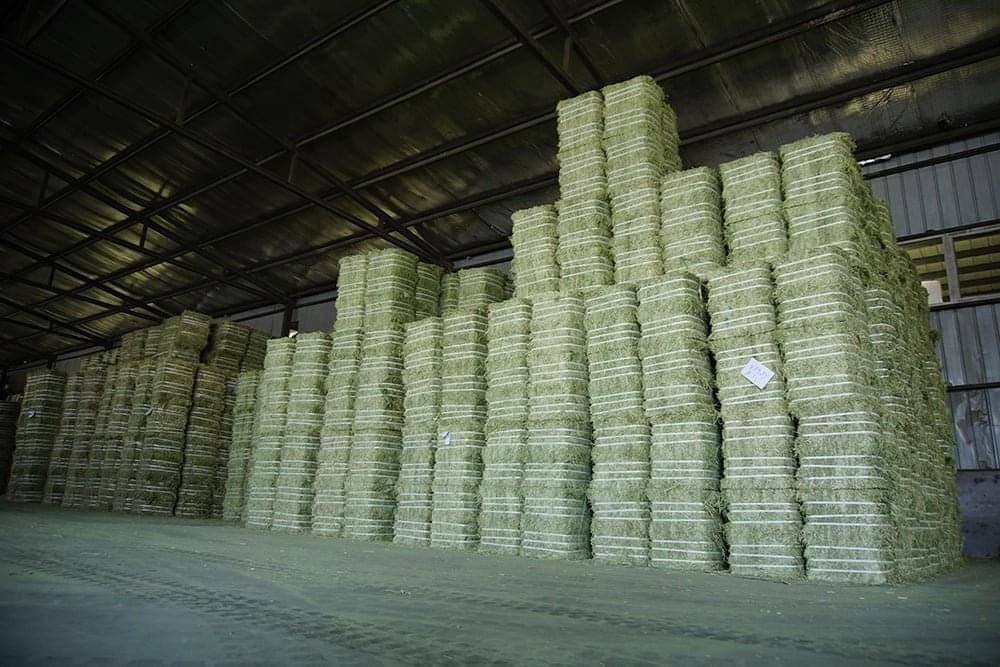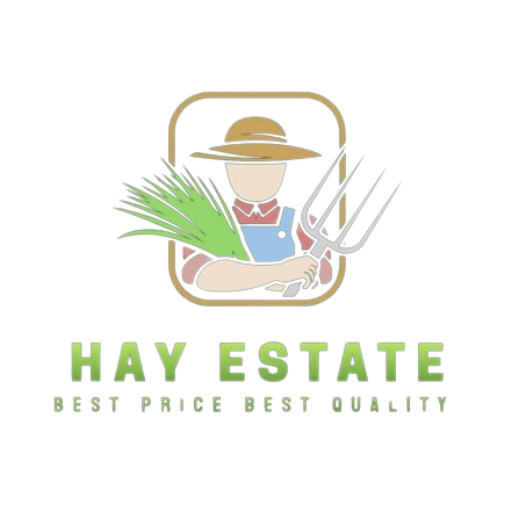At Hay Estate we offer the finest quality hay for sale . Our hay come in various sizes – with big, medium and small bales available, depending on your needs.
Based in the community of Weatherford in TX, our Supplies are found in other parts of the country .Our straw and hay for sale can be delivered directly to you regardless of where you are. since 1989 Hayestate has been the trusted source for premium hay for all animal types. Our secret ? decade long partnerships with the same top tier producers in California, Oregon, Washington , Idaho and the list continues ensuring consistency and quality you can count on .
Every bale we offer is guaranteed non GMO and nutritionally tested to meet your animal's needs. We have the perfect forage solution . Plus we offer options for those with limited hay storage space.
Located in Weatherford, Texas off Highway 180, our retail facilities is stocked year-round with a dozen premium hay varieties, available by the bale or by semi load for larger facilities. Stop by our retail location or give us a call for semi loads . At Hayestate, we're dedicated to quality, consistency and expert service come see why animal most especially horse lovers nationwide trust us for their forage need.
MEET OUR FARMERS
Our Oregon Farmer
If you've been to Hayestate, you're familiar with those back-breaking, insanely heavy, luscious 135-pound, 3-string bales of Timothy and Alfalfa your horses love. This family is responsible for your chiropractor bills. We've heard it all: "Don't tell my husband how much they weigh, he's offloading!" "It's so beautiful, my horses are addicted to it," "One bale feeds forever," "My horses love it, my back hates it, and my horses have never looked better."
They're 5th generation farmers from Oregon, whose family's farm is nestled in the most beautiful scenery you've ever seen. Their family instills old-school values into their three young children, who are as involved in the farming process as they were in their youth. "In a world that seems to change by the day, farming allows us to instill strong work ethics and teach life lessons to our kids that reward hard work and good ideas as we watch the crops grow. From a very young age, our kids have been involved in producing hay. Buying from hay estate means you are helping raise a solid and experienced next generation of farmers!"
The unusual 23"x17"x44" extra-heavy bales are produced with vintage New Holland balers. Every winter, all their equipment is torn down and rebuilt, keeping their 1970s and 80s balers and equipment like new. During harvest, it's a 24/7 job for the entire family to produce their 1st cut Timothy, 2nd cut Timothy, and Alfalfa. All of their hay is stored in an impressive, picturesque barn. As romantic as it sounds, the winds in their valley can reach 80+ mph with blinding blizzards. Thanks to these beautiful barns, they can load semi-trucks out of the elements, ensuring we have an annual supply.
When they first contacted me in the mid-2000s, I was committed to another producer. It took over a year of conversations and consistent samples of the most beautiful hay I've ever seen before I made the leap and changed producers. The quality of their beautiful hay has never changed: from the extra-heavy bales to the soft texture, color, and aroma, all remain the same to this day.
Along with his father and brother, have taken the word "quality" to a whole new level. He says the most important part of their business is allowing clients like Hay USA to focus on what they do best. "Every field can be a little different and that's completely normal," he adds. "What we focus on is making sure each bale from that field looks and tests the same."
He knows each customer that comes to Hayestate has a need. "Our commitment to Hay USA is helping support their clients with premium forage. We're grateful for Liz and her clients and their appreciation for what we do."
So, when you visit Hayestate, be thankful for this family for their dedication. Their handpicked, nutritionally tested hay ensures quality and availability year-round, keeping your horses happy and healthy.
Our California farmers
Our California Farmer
Welcome to the thrilling tale of Hayestate, where determination, adventure, and the spirit of the West converge. The story takes a wild turn in the early 90s with a pivotal character: a third-generation farmer and buyer from a beautiful valley in southern California.
Since the 90s, our beautiful three-tie California Giant Bermuda and Alfalfa have come from the same valley, thanks to him. Partnering with the best growers, he personally inspects each crop to ensure top-notch quality. On his 25-acre facility, there's a dedicated barn just for Hayestate, guaranteeing consistent hay all year round. He initially put Hayestate on the map with his unwavering commitment to quality and consistency.
His journey began in the Imperial Valley, where his family has been farming since 1938. He married his high school sweetheart, and they have two daughters who understand and embrace the hay business, continuing the family legacy.
"Starting in May, the we'll have over 120 consecutive
days of 100-120+ degrees, making for a very long growing season. With nine annual cuttings of Alfalfa and six cuttings of Giant Bermuda, this creates a secure annual supply," he explains.
Their success stems from his long-standing relationships with premium farmers in the valley, built on mutual trust over 30 years. He has been proactive in keeping GMO 'roundup ready Alfalfa' out of the valley, a battle he and his partners have successfully fought annually.
The partnership between Hayestate started in the mid-90s, during a serendipitous visit. "She walked into my office on a whim after another hay company did not take her seriously. I remember saying, 'I have a beautiful wife and two little girls I need to support and I would love to do business," he recalls. Despite the scorching 126-degree heat, he showed Liz miles of hay stacks, sealing their partnership with a handshake. Together, they pioneered the introduction of California hays to Texas and their collaboration has flourished ever since.
He holds onto old-school values, emphasizing the importance of keeping one's word. "An early mentor of mine said, 'Don't ever break your word; your word is worth more than money. I teach my girls those same values." His daughters have grown into bright young women, focused on education and understanding the hay business, ready to take it to the next level when the time comes.
Their unwavering dedication and deep-rooted values have been instrumental in the success of Hayestate. His passion for quality hay and commitment to integrity have made him a cherished partner in this exciting journey.

our Washington farmers
It was the 90s when I first met the second generation of a well-known hay family at the National Hay Association Meeting in Ohio. He showed me two brown paper boxes filled with top-quality Timothy and Alfalfa hay. This moment marked the beginning of my education in the hay business and set the stage for a long and fruitful partnership with this family.
Fast forward to today, and this family, now heading into their fourth generation, supplies Hayestate with a stunning array of beautiful hays. Their offerings include 3-tie and compressed Alfalfa, 1st and 2nd cut Timothy, and Teff Grass. Their roots in farming trace back to the 1930s in Ellensburg, starting with the first generation and continuing through the second, third, and now the fourth generation.
In the spring of 2022, California faced an unprecedented water shortage, and this family came to the rescue. They
weren't strangers to Hayestate and welcomed us with a specialized inventory plan that helped us grow into what we are today. The third generation personally selected two experienced men, who, with a combined sales and farming experience of 42 years with the family's operation, ensure our needs are met year-round with consistent, high-quality hay.
The third generation and his wife have three talented children who carry on the family legacy. Their oldest is the Director of Sales and Marketing. Their daughter runs a successful small pet forage line on Amazon. The youngest is deeply involved in the family's regenerative ranching operation, following in the footsteps of his great-grandfather and grandfather.
This family produces thousands of acres of premium forage, securely irrigated from the abundant water sources in the Pacific Northwest. They supply Timothy hay to some of the world's elite racehorses, including several Triple Crown winners and other champions.
When you come to Hayestate, you can thank this family for the security of knowing your hay is handpicked, consistent, nutritionally tested, and available year-round. Their dedication and expertise ensure that we provide only the best for our clients.
This family's long-standing commitment to quality and innovation has made them an integral part of Hayestate's success story. Their deep roots in farming, coupled with their forward-thinking approach, have helped us navigate challenges and seize opportunities. From their humble beginnings in the 1930s to their current status as industry leaders, they exemplify the values of hard work, integrity, and excellence.
As you enjoy the premium hay from Hayestate, remember this family's dedication and passion that make it possible. Their legacy continues to thrive, ensuring that we always deliver the highest quality hay for your needs. Come visit us and experience the exceptional quality and service that this family and Hayestate proudly offer.
Hayestate, INC
